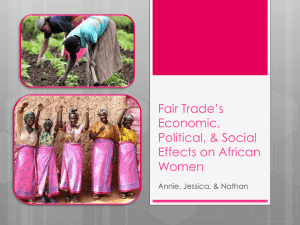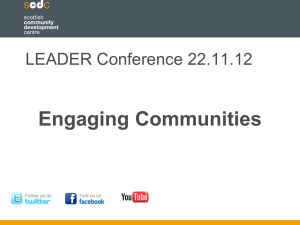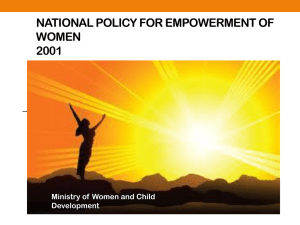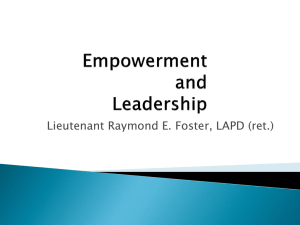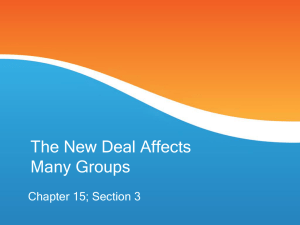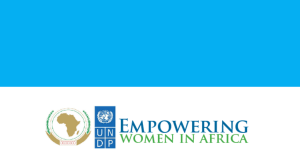Political Committee UPDATE POWERPOINT
advertisement
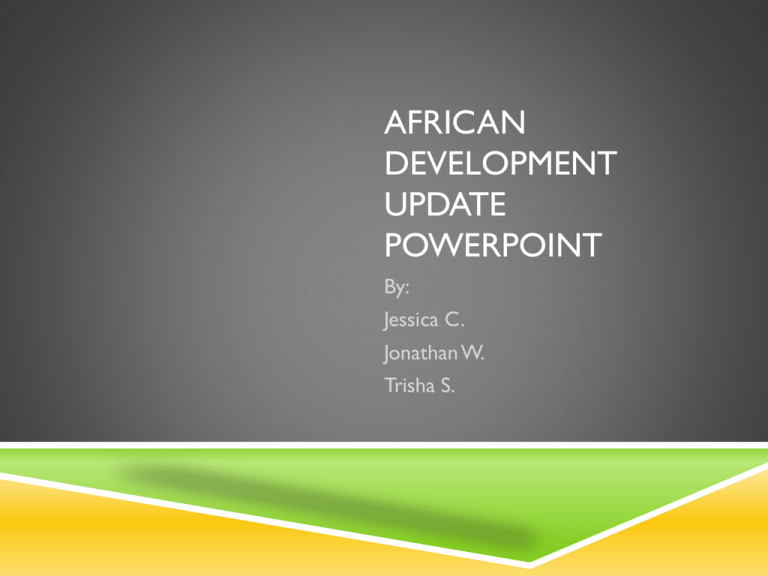
AFRICAN DEVELOPMENT UPDATE POWERPOINT By: Jessica C. Jonathan W. Trisha S. SECURING POLITICAL STABILITY IN NORTH AFRICA FOLLOWING THE ARAB SPRING KEY COUNTRY: TUNISIA • President Ben Ali resigned on January 11th, 2011 • Interim Prime Minister Mehdi Jomma (formerly Minister of Industry) took Prime Minister office in January, 2014, leads technocratic interim government • Constitution drafted by Constituent Assembly adopted on January 26th, 2014 • Strong relations with the US and other Western • Since Tunisia’s revolution started the Arab Spring, the government most definitely supports the Movement. However, it is generally focusing on building its own economy and encouraging private business initiatives to increase employment and satisfy the people KEY COUNTRY: EGYPT • Has seen the overthrow of two presidents (Mubarak and Morsi) since its revolution • Currently governed by the military government of Gen. Sisi, who overthrew Morsi in a coup d’etat (Morsi now in jail facing 4 charges) • Has had three constitutional referendums: March, 2011, December, 2012 and January, 2014 since Mubarak’s fall • Unrest continues after the military takeover of the government: • Hundreds of police and soldiers killed by Islamists • Muslim Brotherhood was declared illegal in September, 2013 • Presidential elections to be held in April, 2014, in which Gen. Sisi will most likely run POSITIONS OF COUNTRIES/ORG. • EU has been supportive about the transition to democracy that the Arab Spring is supposed to bring about. • Committed to help North Africa establish lasting democratic practices, including a government elected through free and fair elections, freedom of press, and an independent judiciary branch. • However, it has been criticized for not reacting strategically since the opinions of the EU can be fragmented at times due to the myriad of nations in the EU. • It has granted more than 7 billion Euros to aid reconstruction and development in the region. • Recently, EU’s monetary aid has slowed due to the Euro zone crisis. Instead, it has emphasized the importance of building consensus among revolutionaries POSITIONS OF COUNTRIES/ORG. • China maintains its foreign policy of non-intervention in the Middle East. It does not seek to help the regime in power by sending military assistance seeing as its main interests in the region are political influence and economic benefits. • Russia like China, has vetoed several SC resolutions drafted by the West. Both Mubarak (Egypt) and Ben-Ali (Tunisia) were Russia’s allies in the region. It has provided and continues to increase military assistance to regimes like that of alAssad’s in Syria • US being an enthusiastic supporter of democracy, approves of the rebels in the Arab Spring. During Tunisian Prime Minister Jomma’s recent visit to Washington (April 4th), President Obama praised Tunisia as the “poster child of the Arab Spring” in addition to granting $500 million to aid Tunisia’s renewed economic development. On the other hand, US has currently suspended monetary aid to Egypt due to allegations of Egyptian government’s human rights violations. SPONSORING ECONOMIC AND EDUCATIONAL OPPORTUNITIES FOR WOMEN AND GIRLS IN RURAL AFRICA CURRENT EVENTS March 5, 2014: South Africa passes a bill aimed to empower women, particularly through the use of education, training, and skill development. This bill is an example of a big improvement for the cause and should be considered as a possible model. March 20, 2014: Egypt holds a conference in Cairo promoting women employment in North Africa. Tunisia and Morocco are also planning to hold similar conferences in April. March 24-28, 2014: Food and Agricultural Organization (FAO) convenes a regional conference tracking Africa’s progress and future in the agricultural industry. 54 African countries participated in the conference. CURRENT EVENTS (CONT.) April 2-3, 2014: The European Union and representatives from African nations meets in Brussels to discuss a variety of topics, including agricultural development and cooperation. Women’s rights and empowerment are extensively discussed in this conference. This is a particularly controversial conference, and may give insight to your country’s thoughts on certain issues and other countries. May 2014: The Gambia will host will host a conference for the Women Advancement Forum. Although this conference has not occurred yet, it can be a door to further understand your country’s stance and position. POSITIONS OF COUNTRIES The issue of women empowerment is met with widespread agreement that women empowerment is essential and necessary. The disagreement and the debate come from the fact that different countries want different degrees of change. Western nations are most likely going to be strongly rooted in women equality. As a result, they are firm believers in women empowerment, and look for effective and concrete actions, evidenced by the fact that the EU has created a plan of action to empower women from 2010-2015. These nations, particularly France, are strong supporters of worldwide women empowerment, and will push for empowerment fairly strongly. Although they agree in the importance of women empowerment, Asian countries are less focused on this topic, and are more focused on political stability and economic development. As a result, representatives of Asian nations should focus primarily on the economic repercussions of each course of action, and how it may also affect regional, international, or national stability. POSITIONS OF COUNTRIES (CONT.) South American nations, like Asian states, are more focused on development. As a result, South American states should push more towards economic and political stability when empowering women. They also look more towards gradual change and empowerment of women. African nations have a bit more mixed opinions. Most African nations recognize the importance of women empowerment in relation to development, but they also recognize the cultural barrier that stops this. African nations will want gradual change towards women empowerment. In some cases, nations may have more opposing views on women empowerment. This can be indicated by a lack of ratifying or signing important treaties and documents, such as the Maputo Protocol, in retaliation to an article pertaining to women empowerment. A barrier exists culturally, especially in rural parts of Africa, since male dominance permeates in most African villages and rural areas. A possible course of action that can counter this is to collaborate and negotiate with cultural leaders. UPDATES ON AFRICAN NATURAL RESOURCES TO FUEL DEVELOPMENT • These recent articles will help your research: • http://newbusinessethiopia.com/index.php/perspective/159-opinion/727greening-africa-s-economy • http://allafrica.com/stories/201404020091.html • http://www.daily-mail.co.zm/index.php/editorial/comments/item/1432women-vital-in-agric • http://africaprogresspanel.org/africas-economic-transformation-therole-of-natural-resources/ • Recent violence in Africa (as well as old conflicts) has a large impact on the distribution of natural resources within Africa due to the violence between ethnic factions (some richer than others) • http://www.globalpost.com/dispatch/news/regions/africa/131226/centralafrican-republic-conflict-political-not-religious - CAR Crisis • http://worldwithoutgenocide.org/genocides-and-conflicts/darfurgenocide - Darfur Genocide POSITIONS OF GROUPS, ALLIANCES, BLOCS • A large focus of this topic is keeping the resources within Africa in order to fuel Africa’s economic development. Groups within Africa work to benefit Africa’s economy through its plentiful natural resources. • The Common African Agricultural Programme, African Mining Vision, African Industrial Development Plan and others frameworks are positioning Africa to harness and beneficiate its vast natural resources, including land, water and forests; minerals and energy and its rich biodiversity and oceanic resources. • The African Union is important in African politics, and is imperative in spearheading cooperation within the continent. • The European Union and G8’s cooperation with African countries in building a sustainable economy has also been important.
